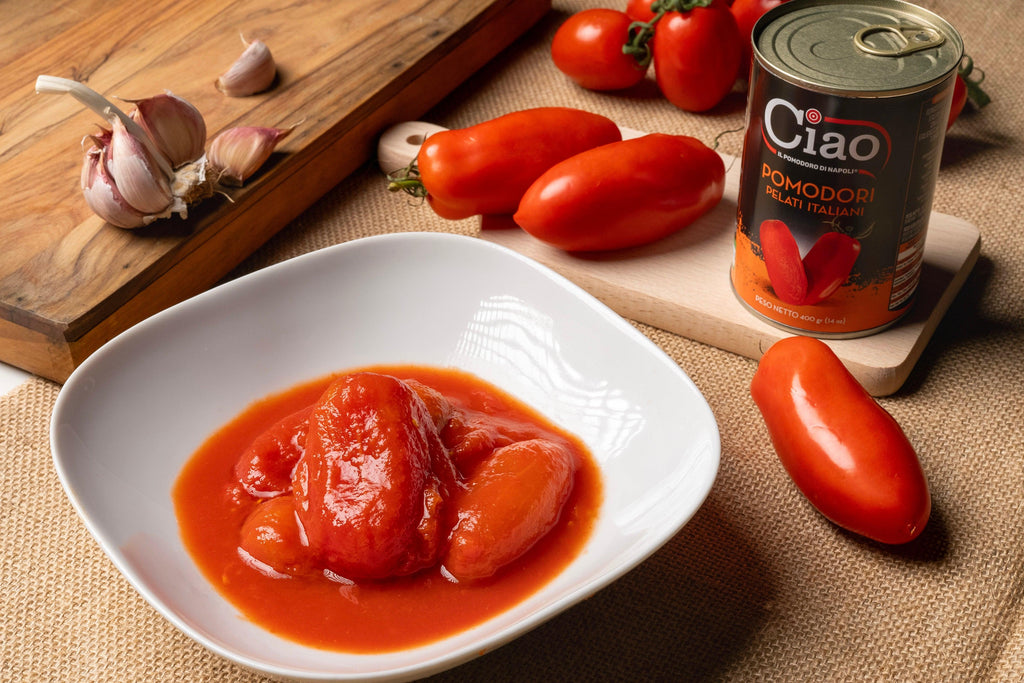The Difference Between Fresh and Canned Tomatoes in Cooking
Canned vs. Fresh Tomatoes: Which is Better for Cooking?
Whether you're flipping through cookbooks, scrolling through online recipes, or reading your grandma's handwritten recipe, you might hesitate when you see “add tomatoes.” What kind of tomatoes? Canned? Fresh from the store? Do they need to be homegrown? Is there really a difference between fresh and canned? The short answer: yes.
Deciding between fresh and canned tomatoes largely depends on the dish you're preparing, but for most recipes, canned tomatoes have a consistency, shelf life, nutritional boost, and sustainability that fresh tomatoes can't always match.
Consistency You Can Count On
One of the most significant benefits of canned tomatoes is their consistency in both flavor and texture. Canned tomatoes — like all our Ciao products — are picked at peak ripeness, delivering that vibrant, sweet, slightly tangy taste you want in cooked dishes like homemade marinara sauce or traditional chili. It's our Ciao promise to carefully select each and every tomato through a highly selective process ensuring the result is perfectly fresh and ripe.

Fresh tomatoes are often harvested before they're fully ripe to endure the journey to stores, making their flavor hit or miss depending on the season and growing conditions. By the time a ripe tomato is picked, shipped to the store, bought, and used in cooking, it has already lost some of its freshness. At Ciao, however, all of our tomatoes are canned within six hours of being picked, ensuring peak freshness when they reach your kitchen!
Not to mention, canned tomatoes break down more easily when cooked, resulting in a smooth, rich texture ideal for soups, stews, and sauces. Fresh tomatoes, on the other hand, might hold too much water and can result in a thinner sauce.
Nutritional Advantages
Both canned and fresh tomatoes are an excellent source of nutrition. Both are low in calories but also full of fiber, potassium, and antioxidants. However, when it comes to lycopene—a powerful antioxidant linked to heart health and cancer risk reduction—canned tomatoes have a distinct advantage. Lycopene becomes more bioavailable after processing, meaning the body absorbs it more effectively from cooked or canned tomatoes than from fresh ones.
From Pantry to Plate
Another major perk of canned tomatoes is their long shelf life. You can keep canned tomatoes in your pantry for several years, making them a convenient option that’s always ready to use. Fresh tomatoes, on the other hand, spoil relatively quickly, limiting their practicality for busy home cooks. Plus, when tomatoes are out of season, “fresh” varieties can be bland or expensive, whereas canned tomatoes remain affordable and flavorful year-round.
When Fresh Tomatoes Shine
Fresh tomatoes do have their place in certain dishes. If you’re preparing something where the texture and raw flavor of the tomato are the stars—like a tomato pesto or a sandwich—then fresh is best. But when you're simmering, roasting, or stewing, canned tomatoes are the better choice for achieving the deep, robust flavor you want.

The Verdict
While fresh tomatoes are great for light, uncooked recipes, when it comes to cooked dishes, canned tomatoes are the go-to choice. Their superior flavor, ease of use, and high nutritional value make them a pantry staple for home cooks and restaurateurs who want to deliver consistent, delicious meals every time. Whether you're making lasagna, pizza sauce, or a hearty soup, reach for canned tomatoes for the best results. And if you need some canned tomato inspiration, we have your back! Check out our constantly growing list of free online recipes featuring our carefully selected, freshly imported tomatoes!


